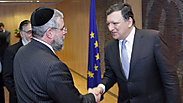
During a meeting in Brussels with state rabbis, including the president of the Conference of European Rabbis (CER), Barroso said the European Commission would not tolerate the violation of important basic religious rights, like the freedom to conduct the circumcision and kosher slaughter rituals.
He added that one of the reasons for the establishment of the European Union was to protect minority rights in the continent.
The rabbis briefed the European Commission president on the problems the continents' Jewish communities were dealing with, mainly restrictions on circumcision, the ban on kosher slaughter and the soaring anti-Semitism. They protested the recent ban imposed on kosher slaughter in Denmark, and the Danish agriculture minister's remark that remark that "animal rights come before religion."
Jews' security needs will be dealt with
Barroso said his organization has no control over the Council of Europe, but that he was strongly against the attacks on circumcision. He revealed that he had demanded clarifications from the Polish government on the slaughter ban and was waiting for its response, and promised that the EU would deal with the security needs of synagogues and Jewish institutions.
He also expressed his interest in the issue of the mapping, maintenance and legal protection of cemeteries and agreed that the European Commission would work closely with the CER on the issue.
Apart from CER President Rabbi Pinchas Goldschmidt, the meeting was also attended by Paris' Chief Rabbi Guggenheim, Poland's Chief Rabbi Michael Schudrich, Vienna's Chief Rabbi Chaim Eisenberg, Brussels' Chief Rabbi Albert Guigui, the CER's Executive Director Rabbi Moche Lewin and others.
Tough year
In the past year, Europe's Jewish communities have experienced a wave of legislation alongside statements violating fundamental principles concerning their lives, mainly in regards to circumcision and kashrut issues. A regulation banning kosher slaughter in Denmark went into effect Monday, and the Polish parliament adopted a similar law about six months ago.
About three months ago, Norway's health minister announced that the country would advance a law to "regulate ritual circumcision," following a call by Norway children’s ombudswoman to ban non-medical circumcision of minors.
The declaration came a month and a half after the Parliamentary Assembly of the Council of Europe, which represents most of the continent's states, passed a resolution calling male ritual circumcision a "violation of the physical integrity of children according to human rights standards."
The decision drew an angry reaction from Israel, which developed into a diplomatic intervention to cancel the declaration.
The struggle for the right to practice circumcision has been held in several countries, and in the past year Jewish and Muslim organization scored a significant victory in Germany, where circumcision was permitted after five months of uncertainty since a court in Cologne defined the ritual as "a serious and irreversible interference in the integrity of the human body."
The German parliament passed a law protecting the right to circumcise infant boys and granting parents the right to circumcise their sons using a certified circumciser. Yet in Scandinavian countries the voices calling for a ban on the ritual are growing.















